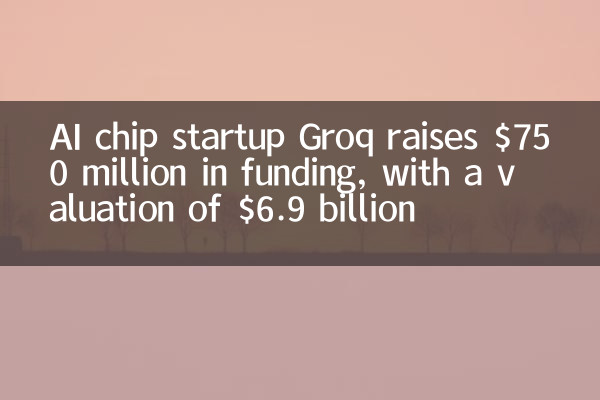AI chip startup Groq raises $750 million in funding, with a valuation of $6.9 billion
Recently, there has been another big news in the field of AI chips. According to foreign media reports, AI chip startup Groq has completed a round of $750 million in financing, with the company's valuation reaching $6.9 billion. This financing event has quickly become a hot topic in the technology circle and has once again attracted the market's attention to the AI chip track.
Founded in 2016 by former Google engineer Jonathan Ross, Groq focuses on the development of high-performance AI inference chips. Unlike giants such as Nvidia, Groq's chips adopt unique architectural design, claiming to provide higher computing efficiency and lower latency. The company has previously launched a number of products, mainly used in data centers, autonomous driving and other fields.

Here are the core data of Groq’s latest financing:
| Financing projects | data |
|---|---|
| Funding amount | $750 million |
| Company Valuation | $6.9 billion |
| Established time | 2016 |
| Headquarters | California, USA |
| Main products | AI reasoning chip |
Financing background and market impact
This financing is at a time when competition in the global AI chip market is intensifying. With the explosion of big models such as ChatGPT, the market demand for high-performance AI chips has surged. According to industry analysts, the global AI chip market size will exceed US$100 billion in 2024.
Groq's successful financing reflects the capital market's optimism about AI-specific chips. Compared with general-purpose GPUs, dedicated AI chips have obvious advantages in energy efficiency ratio and computing efficiency, especially in large-scale model inference scenarios. This is also an important reason why investors are willing to give high valuations.
Comparison of industry competition landscape
| company | Valuation | Main products | Technical Features |
|---|---|---|---|
| Groq | $6.9 billion | AI reasoning chip | Low latency, high energy efficiency |
| Nvidia | $1 trillion+ | GPU | General computing |
| AMD | $200 billion+ | CPU/GPU | Heterogeneous calculation |
| Graphcore | $2.8 billion | IPU | Parallel processing |
Groq's technical advantages
The core technology that distinguishes Groq from its competitors lies in its unique architectural design. The company developed tensor stream processor (TSP) adopts a deterministic execution mode, which accurately predicts computing time, thereby significantly reducing latency. In benchmarks, the Groq chip performs more than 10 times more on some AI inference tasks than traditional GPUs.
In addition, Groq's software stack is also quite distinctive. Its compiler can map AI models directly to hardware without manual optimization, greatly reducing the development threshold. This feature gives it obvious advantages in rapidly iterating AI application scenarios.
Future challenges and prospects
Despite receiving huge financing, Groq still faces many challenges. First, there is competitive pressure from giants such as Nvidia, and second, the construction of the ecosystem takes time. AI chips not only require hardware performance, but also require complete software tools and developer community support.
However, with the continuous expansion of AI application scenarios, the market demand for dedicated chips will continue to grow. If Groq can seize this opportunity, it is expected to occupy an important position in the field of AI chips. The company said that the new financing will be mainly used for product research and development and market expansion, and plans to launch a new generation of chip products in the next 12 months.
Overall, Groq's successful financing once again confirms the popularity of the AI chip track. Against the backdrop of rapid development of AI technology, the innovation of dedicated chips will continue to gain the favor of capital, which will also promote the technological progress and application implementation of the entire industry.

check the details

check the details